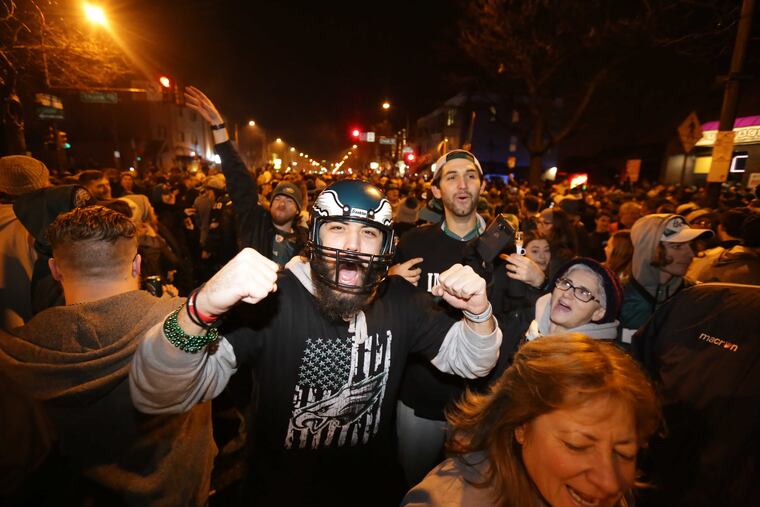A Super Bowl baby bump? Not in Philadelphia after the 2018 Eagles win.
The Eagles' 2018 win over the New England Patriots spurred plenty of celebration. Just not THAT kind.

Maybe the fans were too busy trying to climb the light poles.
Nine months after the Eagles won the Super Bowl, the birth rate in the eight-county Philadelphia region was no higher than in a typical November, an Inquirer analysis of health statistics reveals.
In fact, it was lower than the number of births in any November for the previous 10 years.
A Super Bowl baby bump was forecast by many following the Feb. 4, 2018, victory over the New England Patriots, and for the love of Jason Kelce, why not? Passion was in the air. People hugged in the streets. The Jefferson Health system even ran a playful commercial with a stork, vowing to deliver “super babies" in nine months.
But now that 2018 birth statistics have been painstakingly tabulated by the state and federal officials whose job it is to do such things, they do not support the super-baby theory.
Women who live in Philadelphia gave birth to 1,596 babies in November 2018, the lowest total for that month in any year starting from 2008. The next-lowest November total, in 2017, was more than 100 babies higher, at 1,689.
The 2018 numbers are preliminary but not expected to change much. They are collected by state health departments and aggregated by the U.S. Centers for Disease Control and Prevention.
And before the math teachers out there start weighing in with talk of denominators, note that the city’s population increased steadily throughout that period. So the number of babies delivered per 1,000 residents declined even more than the raw total.
What if you include the suburbs? Still no. And we don’t mean maybe, baby.
Women who live in the eight-county region gave birth to 4,690 babies that month, again lower than any November since 2008. Yet the region’s population grew throughout that time.
To be truly scientific, we would factor in the numbers of women of childbearing age. We also might compare the birth rate in the Philadelphia area with that outside Eagles territory, maybe in some city (cough, cough … Boston?) where the team did not win the Super Bowl that year. That’s because fertility rates have been declining in most of the country. So maybe they declined less around here due to football-fueled fervor?
Save it for the medical journals, Dr. Spock. We’re calling this particular myth debunked.
» READ MORE: Baby Carson emerges in time to watch Super Bowl
The Inquirer’s informal findings were no surprise to University of Delaware epidemiology professor Jennifer A. Horney, who said birth rates tend to be affected by broader socioeconomic trends, not isolated events, no matter how dramatic. She has found that hurricanes have no significant impact on the number of babies born nine months later, for example.
Likewise, when a North Carolina State University researcher counted births in the home counties of Super Bowl winners from 1994 to 2014, he found the numbers rose on eight occasions compared with the previous year, went down on 12 occasions, and one time stayed the same.
“People’s economic status or employment are probably a lot more relevant to their decision to have a baby than events like a disaster or a Super Bowl victory,” said Horney, director of Delaware’s epidemiology program.
Young couples did express Eagles spirit in other ways in 2018, however. Among children who were born in Pennsylvania that year, there are more Carsons than usual, despite the fact that quarterback Carson Wentz was sidelined with injury for the big game.
He is back in action this year, hoping to spark a second citywide celebration. It just probably won’t be the kind in the bedroom.